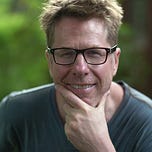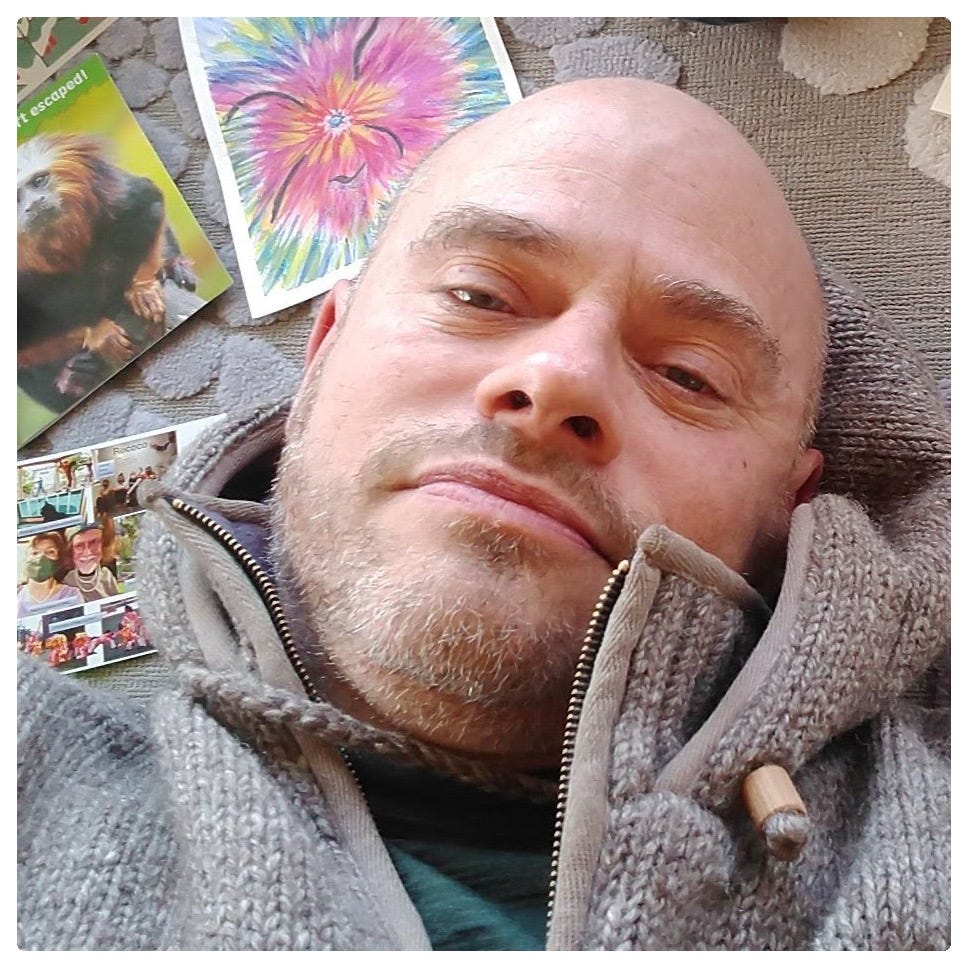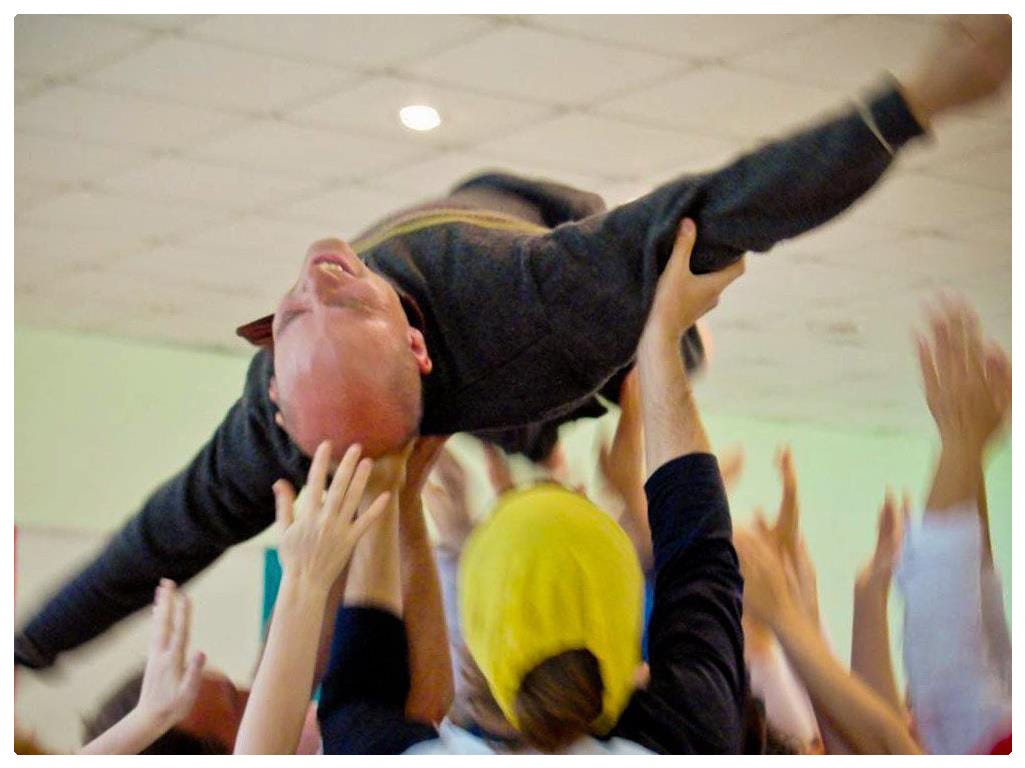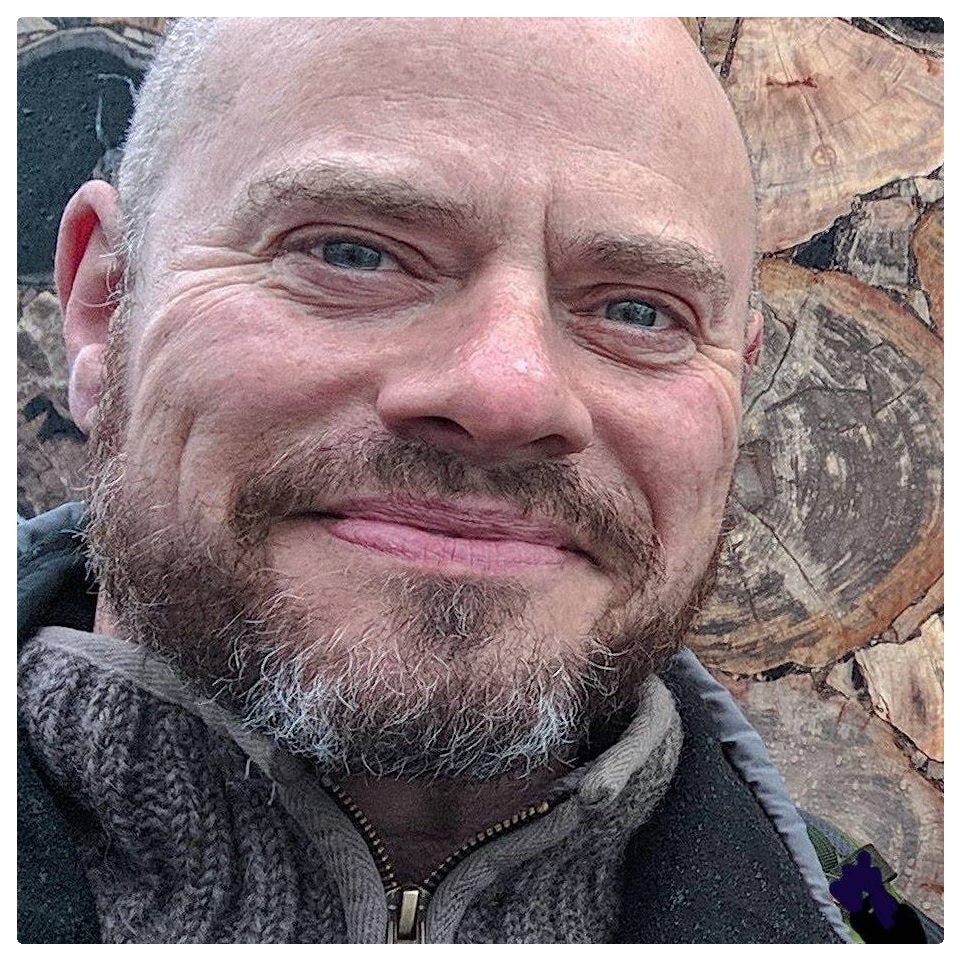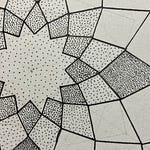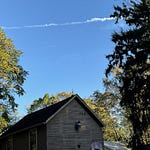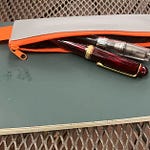Hi. I’m Hal. Welcome to “Living in a Body.” Please click the Play button above to hear the podcast version of this publication. I hope you’ll share this episode with one friend. Thank you!
Recently, I had a long phone conversation with my new friend, Martin Keogh. I’m glad to share that conversation with you here today. Martin and I share the very difficult reality of having been living full creative lives when we were each suddenly taken down by this damn illness. He’s been living with a severe version of ME/CFS since 2018.
Martin Keogh was born in Canada, grew up in Mexico and spent most of his adult life in the USA. He says his bones are Canadian, his blood is Mexican and his muscles are American. He was a priest, but then he discovered contact improvisation dance. He likes to say that dance saved him from a lifetime in the priesthood. Before ME/CFS smote him, for forty years he toured to several continents a year teaching and performing dance. He’s the father of four and now the grandfather of four. He recently published his sixth book. It’s a book of poems called “Naked Realities.” You will find him on facebook as “the Missing Neighbor.”
The Missing Neighbor
Hal
Hello, Martin.
Martin
Hi, Hal. Thanks for having me.
Hal
…You know, I've always pictured you being on the East Coast.
Martin
No, I live on an island in British Columbia… a very beautiful island.
Hal
You know, I was just downstairs on my porch reading some poems from your book, Naked Realities. And every single one, I can relate to. And that doesn't often happen with me and poetry. I was just like, wow, this is speaking my language. Thank you so much for this book.
Martin
Oh, thank you for that. It's been amazing for me with this condition, bedridden about 22 hours a day, to find that I could write for 15 minutes a day, that I had the brain cells to do that. And then, lo and behold, 15 minutes a day can actually become a book that people can hold in their hands and hearts, after 18 months. So, even with this condition, with just that little drip drip of effort, something can appear.
Hal
Wow. So does one of these poems take you about 15 minutes?
Martin
It's funny, there's a poet, he's dead now. His name was William Stafford. And he wrote a poem every morning, no matter what. And the first year, he threw them out every day, but his wife snuck them out of the trash. And at the end of the year, she opened them all up and said, “Look, there's like 60 good ones here.” And that was his first book. And I'll never forget, because I asked him, I said, “What do you do if you don't like the poem?” He said, “I lower my standards.” So every morning I write one, well, not every morning, but most, no matter what. But by the time I've edited it, and polished it, it's a whole week of 15 minutes. But just like being physical, if I try thinking for too long, I also crash, so I have to not keep going even when I want to.
Hal
And that's because of this illness that you're living with.
Martin
Yes, which from “Living in a Body,” I love you calling it myalgic encephalo-fuckin’-myelitis, also known as chronic - fuck you - fatigue syndrome. I love that.
Hal
That is one of my great contributions to the illness, I think. Hopefully, it’ll catch on.
I know, isn't it frustrating? Isn't it? I mean, frustrating is kind of a small word for what it is.
Martin
Yeah, and it's, it's this thing that, you know, we all used to live these full, rich lives. And now we can't, because we're punished if we live or even, in some ways aspire towards living those lives that we used to have.
Hal
You know, this reminds me of one of the poems that just jumped right at me. It's right at the beginning of the book.
Martin
”It's like amnesia?”
Hal
Yeah. “Like Amnesia.” That's the one I think that yeah, “It's Like Amnesia.” “Every time I feel a smidgen better…”
Martin
”I forget I am ill and rush into the joy of activity. And again, I find myself falling into the abyss where fatigue has no boundary. All these years later, I rushed to the joy of activity every single time.”
Hal
“I feel a smidgen better.”
Martin
Uh huh. I put that one first because… I don't think everybody shares everything that I've put in the book. But that one, almost everybody with this condition knows that, that it's like, oh, I'm a bit better. My old self is back yay. Oops, wham!
Hal
One of the things I like about the poems is that they're short and they can be taken within a single bite. They say so much in just a few lines. Is there a name for this kind of poem?
Martin
It’s funny. I call them poetic reflections, because they're kind of prose, but broken into poetry lines. So I take something that I notice or some feeling that comes up as a result of living with chronic fatigue syndrome… with ME and I lay it out as my gut says it right away. And I do go back and iron the language a little bit and work with sound some but it's read very conversationally. And sometimes an image sneaks in… I want to read you one of my favorites. It's this one…
“No one chooses to get sick. Illness chooses us, summons us, consumes us in an instant. No one chooses to have their life dismantled, their agency impaired. No one chooses to live with the three daemons of long haul illness — doom, depression, and despair. After the capacity to choose get stripped away, we sink into an immediate proximity to the bear and fiery filament that bestows life.”
Hal
Would you say that last line again, I need to hear that a couple times,
Martin
“after the capacity to choose get stripped away, we sink into an immediate proximity to the bear and fiery filament that bestows life.”
Hal
Dang. Those are some deep words.
Martin
And it feels like we have to… we lose so much, like what is still there that's keeping us alive? Whatever is at the core of life is there keeping us alive. And the photo, the painting that's on the cover is from that poem. And it's actually a painting of the Annunciation of when, I forget the name of the saint, who comes down and tells Mary that that she's pregnant with God's child. And then you see in the image, this bright filament in the painting.
Hal
Just so everyone knows that we're reading from a book called Naked Realities — Living with an Invisible Chronic Illness. These are poetic reflections by the missing neighbor. And Martin, I don't think I see your name anywhere on the book. Was that intentional?
Martin
That's very intentional on several levels. One is for the listeners who don't know, those of us with this condition, our lives get smaller and smaller. And there's a way in which we become missing from life. And we are called the “millions missing.” And I know that I am one of the “millions missing” because I used to tour and teach dance on several continents a year. I had a very big life and it in a sense got robbed from me. So I wanted some way to say that this book is by one of the millions missing and I thought oh, the missing neighbor. Also it makes it gender unspecific. Because so many more women than men suffer this disease. (I think it's 80 or 85%.) I wanted people who read it to be able to go “Oh, like any one of the missing millions, the millions missing could have written this.”
Hal
Wow. Is there a part any part of you that wants credit — wants Martin Keogh to get credit for this?
Martin
Oh, Hal. To be honest. Like in my own, let's say Facebook community, I've let people know that I have this. But there's a way in which it's not how I want to be identified is by my illness. And that was another reason I didn't want to put my name on the cover as the author of this. I mean, in a way, it's our illness that's authoring this book. And I want people to still visualize me as somebody who's vibrant and athletic and intellectually engaged. Even though all of those have become such small parts of me, I still want people to see me that way. And that was another reason to have this other name on the cover.
Hal
That's fascinating. You know, I write this weekly Substack. “Living in a Body.” And after today's, my mom called me crying, she was crying. And I was thinking I gotta, I should lighten this up a little bit. This is getting too heavy and too depressing. And I don't want to be known for someone who's… I don't want to be known as a tragic figure.
Martin
Mm hmm. And, yes, yours today was about giving up your position as the music director of the Unitarian Church. I read it earlier today. And I actually thought it was one of your best. And how you, in a sense, talking about naked reality, you just really put it out there. And for me, that's what I come back to your substack for is when you just like turn the insides out for us to see. I feel so much recognition in your experience. And it's helpful to me, so I wouldn't encourage you to lighten it up. I would say go for the feeling whatever the feeling is. It helps me anyways, as one of your readers.
Hal
Well, I'm honored to, to know that you're one of my readers. I'm really honored. You know, I wanted to hear a little bit more about when this illness first smote you. Like what what was that transition like from being the vibrant dancer and the athlete? Over how long did it happen? And when did it happen?
Martin
It happened. I just had my anniversary on October 26 of when it happened. And it was literally one day to the next. A week later, I was going to fly to teach this partner dance form that I used to do — contact improvisation dance. I was going to teach in Kyiv and then Barcelona. So five days later, I was going to leave. I was sitting at my desk and out of the blue, I had a heart attack. And it really was out of the blue because I had great blood pressure and ate fantastic foods. I know most of the farmers on the island here, who grow the food to pull the onions and the beets from the ground. There were people who said I was the model of aging well. And I was 60 and but still dancing full out. And this heart attack put me in the hospital for four days.
They went in and they put in a stint. And they said afterwards, okay, everything looks good. But a month later, I had this horrible fatigue. So they went in again and they put in two more stints just to be sure and came out and they did a stress test. And they said, “Martin, you're like a bird in a cage and the door is open, you can fly. Your heart is fine.” And the stress test, which is running on a treadmill for five minutes, knocked me out for two weeks. Couldn't get up. And I had the brain fog and it became clear really soon that something else was going on. And it became…Yep, ME/CFS.
I fortunately had a great doctor. She just retired unfortunately. And I remember her saying to me, she said Martin, I'm willing to give you this diagnosis, but it's such a sad and hopeless diagnosis that we are going to test you for everything else because I would much rather find something that's treatable. And I actually did not get an official diagnosis for two and a half years. And so at the beginning of this year, I finally got into the complex chronic diseases program at BC Women's Hospital. It’s the only program of its kind in all of Canada. And in the very first appointment, they said, “Oh, yep, this is what you've got. And in fact, you are in the severe category.”
It was one day to the next. I couldn't dance. And I also had several books out before that. I couldn't write. It took me a long time to realize, okay, 15 minutes a day, I can write. So there's one poem in there, I love to read this one because it's about the anniversary. I wrote this on the anniversary of the heart attack. And it says,
On each anniversary of the outbreak of this illness, for a time I grow despondent. Yet again, one more year passes deep in this crevasse, staring into the rock walls of boundless fatigue, yet one more year lost in this unending chasm with no maps or signs to direct me towards recovery. After another cycle of seasons, one after the other, I continue to gaze up and there along the top rim of the canyon, that ribbon of cobalt blue sky that guides my life.
Hal
Mm. Beautiful, beautifully read.
Martin
And you know the statistics, that only 5% of people with this disease get out of it. And everybody who gets out, it's by something different. So there's nothing that we can look to that says, “Oh, here's the way.” And I think it's really important for those of us with this disease, in a sense to not have naive hope. Because in the end, naive hope leads us to overdue and crash. But it is good to have some kind of curiosity about you know, something along the way, is going to help us.
Hal
I think one thing that strikes me about this illness is the invisible nature of it. Like, you sound so vibrant on the phone, and so alive and so intelligent and so creative. And from my perspective, people always comment on how good I look. They say, “Oh, you look great, Hal. You look great.” It's just the invisible nature of this illnesses. Do you have any poems about that?
Martin
I think I do. And you know what, people don't see that right now, I'm somewhat lucid, but I've been preparing for this phone call for days. And I've been horizontal. And I got up for breakfast this morning. And then I have had an eye mask on most of the day, so that I can be lucid and awake for you and for our conversation. And so people see me for these moments when I'm actually interacting and quite present but they don't see the other 23 hours of the day where I'm mustering.
Hal
Well, thank you so much for taking the time to do this.
Martin
I would love to read the last one in the book.
Hal
Ode to the Good Doctor?
Martin
No. I Know I Will Recover.
Hal
I Know I Will Recover.
Martin
Yes, it's. Again, I think hope is not the most healthy emotion to have with this illness. That hope leads to overdoing. I know for me it does. But there's a way in which each moment of the day, if I'm just curious about where I am in the moment, and what beauty is around me and what were I can make connection within my limitations. That attitude seems to help me help sustain me. So the last poem in the book goes like this… poetic reflection,
I know I will recover. Against all the evidence and all the odds, I know this to be true. My symptoms will ebb away, my cells will regenerate. I will live a life brimming with vitality, stamina, and the constitution of an ox. To not shatter into a million pieces each week, month and year. I'm compelled and duty bound to hold and trust this to be true.
Hal
Mm hm. Wow. You know, I've recently been in touch with someone who is having some success with a particular diet and it's very extreme. And I, I don't, I guess what I'm saying is, have you tried…. dealing with my own thinking of have I tried this yet? Have I tried this yet? Like, what if this is the thing? What if this is the thing? And there's always that little question of what have I not tried yet? That might be the thing that gets me out of this. Do you deal with that too in your own thinking?
Martin
I do. And so many people propose so many things to try. And I always now come back and say, “Do you know anybody who this has really helped?” And one of my current doctors in this program says there's so many things out there that will actually help you for a month, but they're not sustainable long term. A lot of them is because you've put so much mental energy into them that they are going to work. So if enough people say, “Oh, this has helped them,” then you know, something, I might give it a try to. Like there's some supplements I take because enough people have said, “Hey, this really helps me” and in my experiences, they helped me. And then at this program, they've prescribed this trio of medications to me that do not do anything for my physical stamina, but they really helped my mental stamina and also a little bit my social stamina. The fact that I'm here talking to you on the phone is really helped by these meds. And so… I'm happy to treat the symptoms, to have little increments of things being better. But of course, I think the hardest thing and the most helpful thing is pacing.
Hal
Yes, that is the hardest
Martin
Doing less.
Hal
Yes. It’s the hardest thing and the most helpful thing for creative guys like us are for creative guy like me, I just want to go I just want to, if I get energy, I want to use it to create something.
Martin
Yes. And Hal, I see you, you know, you're traveling to Texas to see your daughter's play or you're traveling to Chicago to go to a concert and I just go, “oh my god, how do you do it?”
Hal
Those were both questionable. They I think they made me worse.
Martin
Yeah, it's those things. We want to do them so badly. I mean, it's your daughter. You want to see her in the show. And then it's like, “oh, God, what is the price that we're going to pay?” Sometimes I'm here going “Hal, don't do it. Don't do it!”
Hal
Yeah, you and the rest of the CFS community have been have learned their lesson. Hey, coming back to the naked realities. Were you a poet before this before the illness? Or were you a writer?
Martin
I was a writer but I never thought I would put out a book of poetry. And it is a big surprise to me. I love language. In my teaching, I was known, even though I'm a dancer, I was known for my use of imagery and language to get people moving because I found good image could really get people moving like they had never moved before. Images move in my veins. And so somehow now they move out towards these poems each morning… these poetic reflections about this condition that you and I unfortunately have to share.
Hal
Well, Martin, thanks so much for this conversation. It's really been, it's really been nice to talk with you. I love hearing your perspective.
Martin
Thank you for having me. And just to let people know I'm on Facebook and Instagram as the naked…. the Missing Neighbor,
Hal
The Missing Neighbor
Martin
I put up a reflection once a week. And so people they can get the book or they can just follow me on one of those two places. So Hal, thank you for all that you do for educating people on this for doing it with such candor. And thank you for having me here today. This has actually been quite fun.
Hal
I know. I think it was fun too maybe I'll keep doing this conversation kind of thing.
Martin
Yeah. And Hal, I was serious what I said you're, you're “Living in a Body.” When I see it in the email box, I get excited. And it's because you talk so eloquently and honestly about this disease. Like today was this mixture of, in a sense what has been most precious for you and you having to say goodbye to it. It was incredibly moving. I didn't think it was heavy at all. Actually, it was full of feeling. I would not have put the word heavy on it. But that's the perspective of somebody who's got the disease reading it. I'm sure your mother will have a much different perspective. I’d like to meet your mom. I imagined she's quite full of beans actually.
Hal
She's quite full of beans. Exactly.
Martin
Okay, Hal we should hang up. This is too much fun.
Hal
I look forward to the next time, Martin. Thank you.
Martin
Me too. Okay. Thank you. Goodbye.
Thankyou so much for being here. Enjoy the day. ❤️ Hal

